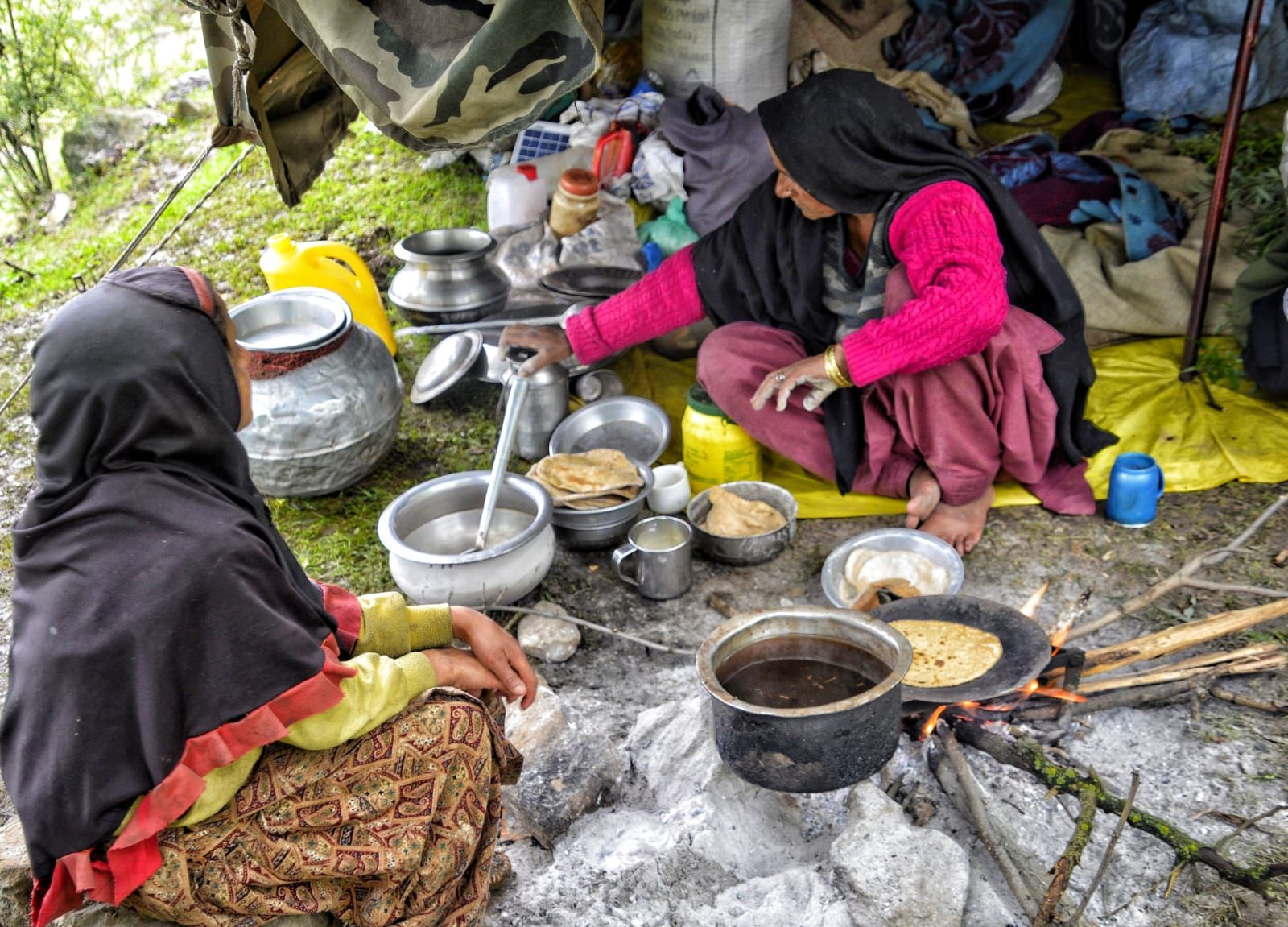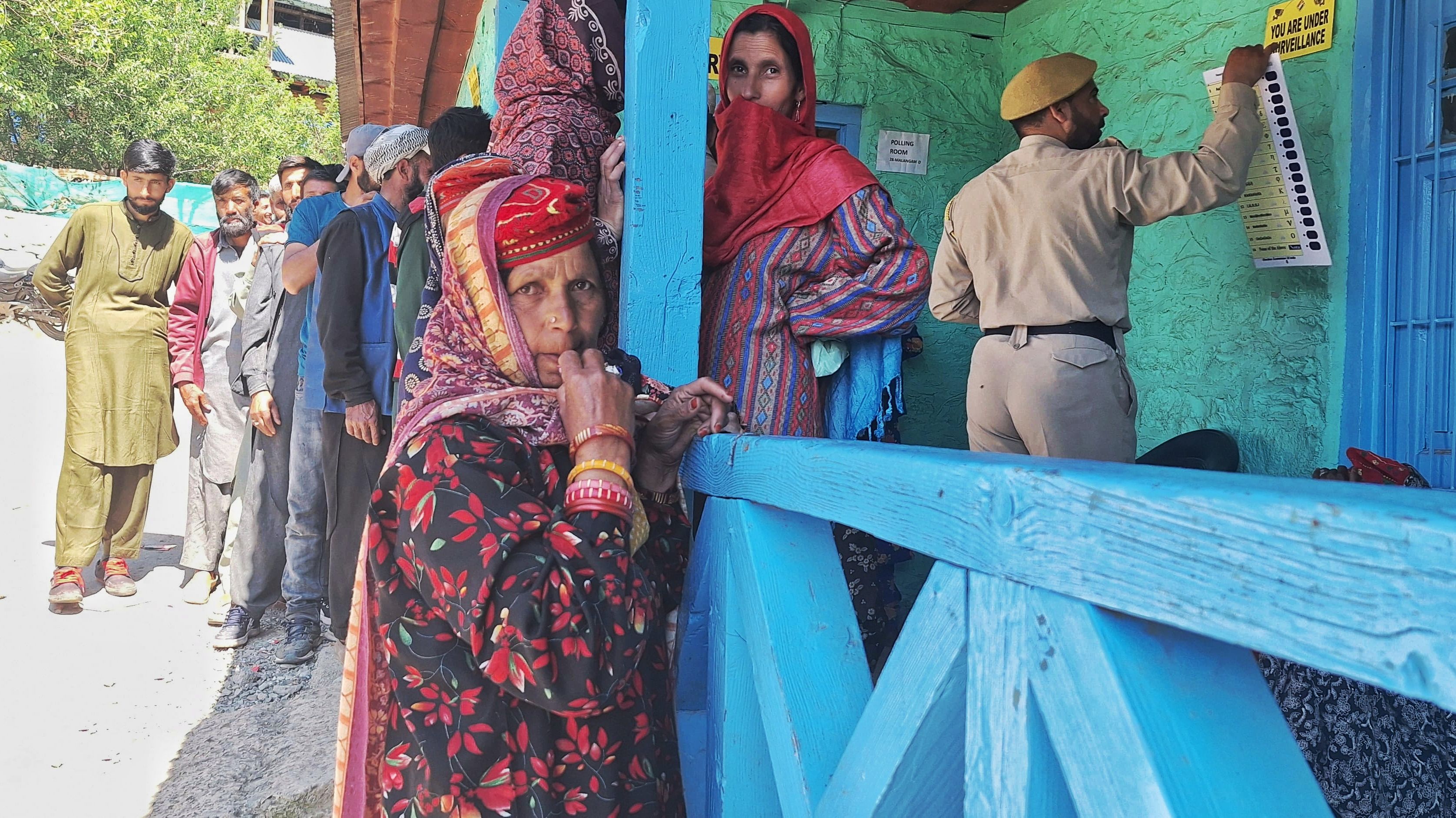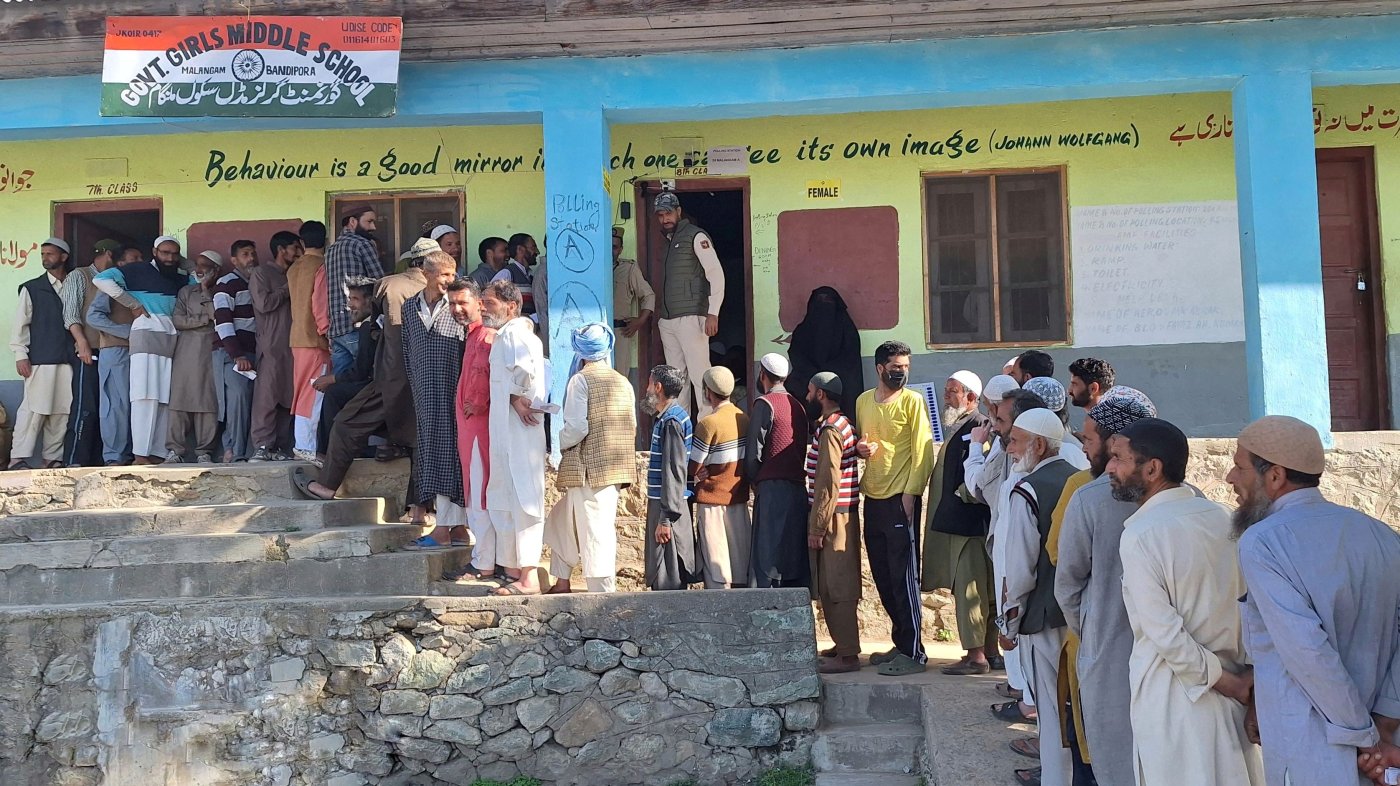Srinagar: On 11 May 2024, the Jammu and Kashmir Pahari Cultural and Welfare Forum, a socio-cultural organisation representing the Pahari tribal community of Jammu and Kashmir (J&K), issued an appeal to its members: support People’s Conference president Sajad Gani Lone, former separatist and a candidate for the 2024 Lok Sabha election from the Baramulla constituency in Kashmir.
Raja Aijaz Ali, president of the forum, declared at a press conference that the Jammu and Kashmir National Conference (NC) and the People’s Democratic Party (PDP), the leading J&K parties, had done “grave injustice” to the Paharis, and that Lone, as social welfare minister in the erstwhile state before it was made a union territory in 2019, played a role in the 2020 decision to grant a 4% reservation to Paharis.
As social welfare minister in 2018, Lone had been the minister in charge of the bill enabling reservations in jobs and college admissions for Paharis, more than 100,000 of whom are registered as voters in the Baramulla Lok Sabha constituency.
As many as 1.6 million of the Pahari ethnic group were added to the list of scheduled tribes (ST) in the union territory when the Rajya Sabha passed the Constitution (Jammu and Kashmir) Scheduled Tribe Amendment Bill, 2023 on 9 February 2024.
The Paharis are dominant in the Uri and Karnah assembly segments of Baramulla, meaning that their support was seen as a significant boost to Lone.
The move to extend reservation benefits to four ethnic groups ahead of the elections by including them among scheduled tribes is seen by observers in Jammu and Kashmir as part of the Bharatiya Janata Party (BJP)’s strategy to buttress its electoral strength in the union territory.
The inclusion of new groups among the scheduled tribes would strengthen the party’s position in the Muslim-majority districts of Rajouri, Poonch and Pir Panjal (in the Anantnag-Rajouri Lok Sabha seat) in Jammu region too, according to politicians and observers.
The BJP, which fielded no candidate in Kashmir in the current Lok Sabha elections, did say candidly that it would support some candidates. These candidates were seen as BJP proxies in the Anantnag-Rajouri, Srinagar and Baramulla constituencies.
This strategy by the Hindu nationalist party is in line with the targeted shrinking of Muslim electoral influence in J&K.
A three-member J&K Delimitation Commission headed by a former Supreme Court judge was formed on 6 March 2020 and assigned to redraw assembly and parliamentary constituencies.
Article 14 reported earlier (here and here) how the delimitation commission’s creation of five new assembly seats in Hindu-majority Jammu province and only one in Muslim-majority Kashmir could alter J&K’s political dynamics.
The alteration of boundaries based on the delimitation commission’s final report made the Hindu vote a decisive factor in more assembly constituencies than before, a gerrymandering that saw pockets of tribal and scheduled caste dominance also being redistributed among constituencies, providing a context for the BJP’s move to grant reservations to some ethnic groups two months before general elections.
The BJP’s Strategy In Kashmir
The political landscape of Jammu and Kashmir has shifted since the abrogation of Article 370 in 2019, the loss of statehood and the region's restructuring into two union territories.
Alongside traditional parties, such as the Mehbooba Mufti-led PDP, Farooq's Abdullah's NC and the BJP, new entrants are in the reckoning, including the Democratic Progressive Azad Party (DPAP) led by Ghulam Nabi Azad, the People’s Conference led by Sajjad Lone, and Apni Party led by Altaf Bukhari.
The Anantnag-Rajouri Lok Sabha constituency is under close scrutiny for various reasons, particularly since its transformation into a trans-Pir Panjal constituency following delimitation.
After delimitation, the Jammu region retained its two original Lok Sabha seats. However, the Anantnag-Rajouri seat now comprises 11 Assembly segments from Kashmir's Shopian, Kulgam and Anantnag districts, and seven Assembly segments from Jammu's Poonch and Rajouri districts.
Anantnag-Rajouri will go to polls on 25 May, its realignment in 2022 making it a hotbed of political contention, particularly in Poonch and Rajouri districts. These are strongholds of the Pahari-speaking population, recognised by all parties as a crucial vote bank after the union government’s decision to extend reservations to the hill tribe.
The NC and Ghulam Nabi Azad's DPAP are in a fierce contest in this seat.
Historically, the Pahari community has supported regional parties, such as the NC and the PDP. The Gujjars and Bakarwals—a community of nomadic pastoralists who have been the most vocal about their opposition to the inclusion of Paharis as STs— have typically favoured the Congress.
While the BJP’s decision to abstain from contesting the first general elections following the abrogation of Article 370 surprised many, experts said the BJP—having spearheaded the delimitation exercise that was widely perceived to raise the electoral influence of Hindu-majority Jammu, and having strategically courted various communities through reservations—would gain influence.
By its mathematics, for the first time, the BJP may find a foothold in the Muslim-majority Kashmir valley, through proxy candidates.
The BJP's Jammu and Kashmir chief, Ravinder Raina, told Article 14 that they had endorsed, in the current Lok Sabha polls, parties “that demonstrate patriotism, work towards Kashmir’s improvement, foster peace and harmony, and are dedicated to serving society".
Raina did not name any party but said the Congress, NC and PDP were “enemies of the people of Kashmir”, indicating the BJP’s support for the People’s Conference, led by Sajad Lone in Baramulla, and Apni Party candidates in Srinagar and Anantnag.
Students Caught Amid Political Moves
Sumiya Hassan, a 21-year-old student from Uri in north Kashmir’s Baramulla district, has felt rising anxiety over her preparation for the National Eligibility and Entrance Test (NEET)—the national pre-medical entrance test—held on 5 May 2024.
With the recent addition of more than 1.6 million people among the scheduled tribes, competition for the reserved seats has intensified.
Hassan, a Gujjar, a community categorised as ST, has been preparing for NEET 2024 for two years, she said. “It now seems impossible for students like me,” she said, “as the government had given more than 16 lakh (1.6 million) people to scheduled tribe status.”
She said students like her were now faced with the prospect of competing with an “elite class of students” from schools in urban areas.
Most students from her community had never so much as seen a digital board, she said. A nomadic community, Gujjar students often study in challenging circumstances during their migration. She said a student like her would struggle to compete with students enrolled in top coaching institutes.
In 2023, when she was preparing for her first attempt at NEET, the family began its seasonal migration with their livestock towards greener pastures in Bandipora.
“I was neither able to take online classes nor make contact with any of my friends,” said Hassan. “We were out of the network zone, in dense forests, for five months.”
The Gujjar and Bakarwal communities in Jammu and Kashmir have held protests against the inclusion of the Pahari ethnic group in the union territory's list of ST communities for nearly a year,
Why The Gujjar-Bakarwals Are Protesting
Gujjar-Bakarwal leaders said the inclusion of Paharis into the ST category would directly threaten their existing privileges in government jobs and educational institutions.
Abdul Hamid, a Gujjar-Bakarwal activist in Baramulla, said the amended list of STs would mean more intense competition for poor Gujjars and Bakarwals “who lack even basic facilities”.
The amended law increased the number of tribal groups enjoying ST status in Jammu and Kashmir from 12 to 16. The newly included communities are the Paddari, Gadda Brahmin, Koli and ethnic Paharis.

The Gujjar-Bakarwal community is among those that have shared a 10% reservation for STs in government jobs and educational institutions. According to the 2011 census, the Gujjars and Bakarwals constitute 9% of the J&K population of 15.6 million people.
A 2018 government showed that Pahari-speaking people numbered more than 1 million, or 8.16% of the population of Jammu and Kashmir. The Pahari people have traditionally reared cattle and farmed in the hills.
The Paharis live in Uri, Karnah, Nowshera, Sunderani, Rajouri, Poonch, and Kangan areas of Jammu and Kashmir.
The Paddari tribe is mostly settled in Kishtwar, one of the remotest areas of Doda district in eastern Jammu. The Paharis, Gadda Brahmins and Kolis are spread across J&K.
The objective of granting ST status to the Kolis, Paddaris, Gadda Brahmins and Paharis was to provide equitable representation in government jobs and education, as they have been considered historically marginalised communities.
Union home minister Amit Shah declared at a public rally in Baramulla in October 2022, that the bill would not affect the reservation quota that Gujjars, Bakarwals and others enjoy currently.
The situation in J&K is somewhat similar to caste dynamics and demands witnessed among OBCs in other parts of India.
For example, the Dhangars, a shepherd community in Maharashtra, listed as a nomadic tribe and categorised as an OBC community, are lobbying for ST status to access more substantial benefits, driven by a desire to address historical marginalisation and socio-economic challenges similar to those faced by indigenous communities.
Similarly, the Marathas, a once prosperous agrarian community, want to be included among OBCs to access benefits of reservations, a prospect that the state’s OBCs have contested stiffly to prevent a potential redistribution of existing benefits.
Zahid Parwaz Choudhary, head of the Gujjar-Bakarwal Youth Welfare Conference, said the inclusion of Paharis as STs would cause a shrinking of the social and economic empowerment opportunities enjoyed by the Gujjar-Bakarwals. “It is simple,” he said. “The BJP knows it cannot secure many votes in Kashmir, so they are using the Paharis to cut the vote share of other political parties.”
‘Our Files Were Ignored For Decades’
Abdul Majeed Zinda Dil, a prominent figure from the region’s Pahari community, said they had struggled since 1978 along with the Gujjar-Bakarwals.
“We were in the same list, demanding ST status,” said Dil, “But in 1991 when the Gujjar-Bakarwals were given ST reservation, our files were ignored.”
Dil said the Paharis and Gujjar-Bakarwals have the same lifestyle, culture, and traditions. “Yet, it took the government more than three decades to decide that we deserve the ST status too," he said.
He said the J&K lieutenant governor had assured them that the Gujjar-Bakarwal quota would not be affected by the inclusion of new groups among the STs, that the Paharis would not be given rights by “snatching the rights of tribals’.
“This is not a political decision,” said Dil. “The decision is of the judiciary, and we, with the core of our hearts, welcomed it.”
Gulam Mustafa, a local Gujjar activist from central Kashmir’s Ganderbal district, said Gujjar-Bakarwal protests died down once the government clarified that their quota would remain unaffected.
"Those who protested against the inclusion of Paharis among STs are people who were backed by the NC or PDP,” he said.
A Caste Windfall For Assembly Elections
Some Gujjar and Bakarwal activists alleged that the move to include Pahari people among the STs was aimed at garnering more votes from these communities, particularly with assembly elections scheduled for September 2024 .

In Kashmir, after delimitation, three assembly seats are reserved for STs—Gurez, Larnoo and Kangan. In Jammu, five seats are now reserved for STs, namely Darhal, Thana Mandi, Surankote, Poonch Haveli, Mendhar and Mahore. “... the aim is clear, they (the BJP) want to win these seats in upcoming elections,” said Hamid, the Gujjar activist from Baramulla.
About 56% of Kashmir’s Paharis live in Jammu’s Rajouri and Poonch districts. Since their inclusion among the STs, many have joined the BJP. In the 2014 assembly elections, the BJP won two out of the seven seats in Rajouri and Poonch.
Pahari political leader Mushtaq Ahmad Shah Bukhari of the NC, a two-time former member of the legislative assembly representing Surankote in Poonch district,recently switched to the BJP with hundreds of his supporters.
Soon after joining the BJP, Bukhari said that he had kept his promise of joining the party that did justice for the Pahari people. He thanked Prime Minister Narendra Modi, home minister Shah and Raina.
According to the 2011 Census, the Gujjars and Bakarwals account for 35% of the population in the Pir region, while Paharis represent 56% of the population. Of the eight assembly seats in Pir, two have a Hindu majority while the remaining six have Paharis as the dominant community. The BJP is now seen as having an edge in all eight.
State BJP chief Raina said the party was certainly preparing for the Assembly elections, since union home minister Shah had declared that assembly elections in Jammu and Kashmir would be held before the Supreme Court’s deadline of 30 September.
On the evening of 17 May, Shah made a surprise visit to Srinagar. He met several delegations representing the Gujjar-Bakarwals, Paharis and Sikhs at The Lalit Palace hotel. During the meetings, the communities voiced their demands about jobs, reservations, among other matters.
Ahmad Bin Bumla, a member of the Gujjar-Bakerwal community from south Kashmir, said that the home minister sought feedback from them about the post-Article 370 situation.
Shahbaz Peer, another member of the delegation, said 150 Gujjars met Shah and sought a special recruitment drive for the ST community and private sector jobs for their youth.
According to a Srinagar-based news agency, Shah instructed the BJP unit of J&K to prepare to field candidates from all seats in the assembly elections.
“The home minister’s statement indicating that they are not in a rush for the lotus to bloom in Kashmir suggests they are supporting the B and C teams,” said Omar Abdullah, former chief minister of the erstwhile state.
(Tauseef Ahmad is a Kashmir-based independent journalist who reports on climate change, environment, insurgency, food and travel. Sajid Raina is a Kashmir-based independent journalist reporting on insurgency, environment, climate change and rural affairs.)
Get exclusive access to new databases, expert analyses, weekly newsletters, book excerpts and new ideas on democracy, law and society in India. Subscribe to Article 14.

